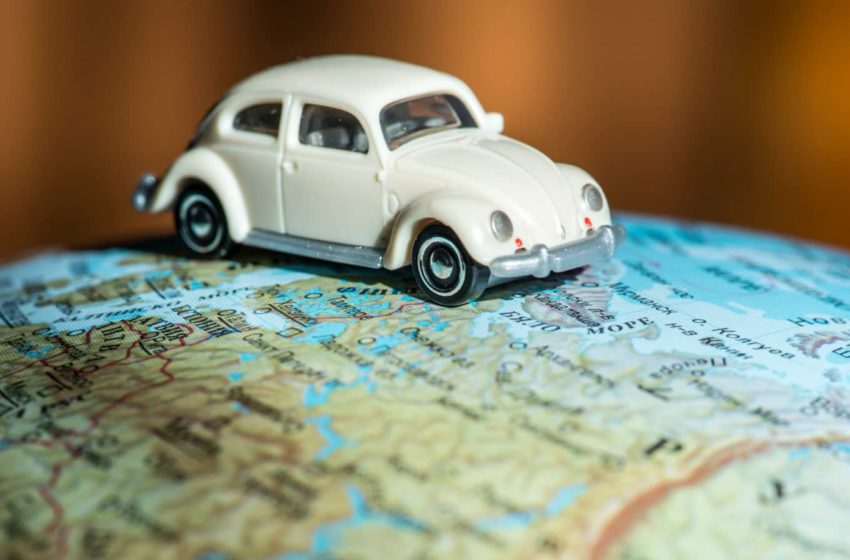Around the World with Jim Rogers

Car figure on globe. Miniature car toy
The legendary investor on global disruptions and his world travels.
Many of us Texans think of our great state as its own country. But there’s a whole wide world out there, and it behooves leaders in any industry to know what’s going on beyond our borders. Who better than legendary investor, best-selling author, and avid globe-trotter Jim Rogers to give Texas CEOs a global perspective? Now based in Singapore, Rogers is the chairman of Rogers Holdings and made the Guinness Book of World Records twice for a 100,000-mile motorcycle trip across six continents as well as a 150,000 miles car world circumnavigation. We asked him about his small-town beginnings and what he sees happening in the rest of the world.
Texas CEO Magazine: You grew up in small-town Alabama. Since then, you’ve traveled to six continents and now live in Singapore. What do you think gave you your interest in the world?
Rogers: Right, I grew up in a place called Demopolis. Our phone number there was five. If you grew up in a town where your phone number’s five, you either want to see the world or you never leave. I knew there was something out there. There were 40 people in my class at school. I tell people I only had 20 girls to choose from! I have young daughters, and here in Singapore, with thousands of children their age, they can’t quite conceive of it. I remember when I was 16, I told my girlfriend I’d never been anywhere. She said, “Well, I’m 16 and I’ve been to Birmingham, Mobile, and Huntsville.” She thought, “Wow, she’s been everywhere!” It made me want to get out and see what was out there. And I’m still doing it.
Texas CEO Magazine: What was it like when you first left Demopolis?
Rogers: I knew nothing about the world when I got to New Haven [to attend Yale University]. I knew nothing even about Louisiana, much less the Northeast. By the time my brother went to Yale 16 years after I did, he could speak like they did because he’d been watching national TV his whole like. But I’d rarely heard a Yankee accent. I’d been talking Demopolis English my whole life.
The world has, of course, changed dramatically since then. I don’t have a TV and I’ve never had a TV, but young people today have access to much of the world through the Internet. My 16-year-old and 11-year-old listen to Korean pop and watch Korean drama. I may not have a TV, but they know how to go on the Internet and see the world.
We still get out and see things for ourselves, too. Last summer, my family and I drove from the Atlantic Ocean to the Pacific Ocean. The highlight of that trip—one of the highlights of my life, actually—happened to be a Texas CEO. My older daughter had said, “We should see a Texas oil tycoon.” I thought, “Wow, how does she know there is such a thing?” But I organized a meeting with the last of the Texas oil tycoons. I thought we’d get to visit with him for 10 minutes or less. But two hours later, we were still there having a wonderful time with T. Boone Pickens. He was great in every way. It was a lot of fun to see T. Boone before he died.
Texas CEO Magazine: That had to be special. Texas thinks of itself almost as another country, but there is a whole world out there that Texas CEOs should educate themselves on. Obviously, China is an area of interest for you. Do you think China’s the country of the 21st century?
Rogers: Yes. China is the only country in world history that’s had recurring periods of greatness. They’ve been great three or four times. Egypt was great only once. Rome was great only once. Great Britain was great only once. But China, for whatever reason, has collapsed three or four times and come back to the top again and again. They are certainly going to have problems, though, just as we had in America as we rose.
Texas CEO Magazine: Is the tipping point their ability to establish an alternate currency to the US dollar?
Rogers: That certainly is in the process of happening, unfortunately. I’m an American, so that’s why I say “unfortunately.” They and the Russians and the Brazilians and a few others are agitated that when Washington gets angry at you, they just cut you off from the US dollar. That’s an abuse of power as far as they’re concerned, so they’re in the process of organizing a competing currency and competing banks to the IMF and the World Bank, which are both dominated by the US. These are facts that are hitting me in the face almost every day.
Texas CEO Magazine: How do you see coronavirus impacting the growth story not just of China but of all the other countries affected?
Rogers: It’s having a huge effect at the moment, as much of China as well as a lot of Asia and elsewhere is closed down. As the consequences continue, it could conceivably lead to China’s first recession in years, since debt has built up in the last 10 to 15 years or so. Recession is coming, whether from China or elsewhere. We are all interconnected now.
But the US had several depressions, a civil war, massacres in the streets, little rule of law, etc., etc., and it still became the most successful country in the 20th century. Recessions and the like are often useful for long-term growth, since they curtail excesses.
Texas CEO Magazine: Does coronavirus increase the risk of government instability around the world?
Rogers: All crises increase that risk everywhere. The subsequent economic slowdown will cause new ways of looking at things as they always have throughout history everywhere. There will be bankruptcies, which will shake up a lot. So, China will see more changes, as has been happening for 40 years, but Mao is not coming back. Worldwide we will see companies, institutions, governments, and even countries fail since so much debt built has built up.
Texas CEO Magazine: How about India? The Indian prime minister visited Houston a few months ago. It seems that India will be a key strategic relationship for the United States going forward.
Rogers: If you can only visit one country in your life, you should visit India. It’s an extraordinary place, both its manmade and natural sights. It’s a sensory feast to just walk down the street. The food, the religions, the languages, the people. But as an investor there are drawbacks, it’s the world’s worst bureaucracy, and I’ve seen lots of bureaucracies. They learned it from the English, but then took it to a higher plane. There’s also an educational shortage there—most Indians don’t even stay in school past 12 or 14 years old. The infrastructure’s a nightmare. There are, of course, some extraordinary success stories coming out of India, but many of the success stories of Indians come out of the US. In India, the educational and entrepreneurship opportunities are not great unless you partner with the right political party.
Texas CEO Magazine: Let’s move to Russia, which has of course been in the American news a lot lately, along with Ukraine. What opportunities do you see in that part of the world.
Rogers: Well, I first went to Russia in 1966, before a lot of your readers were born. Along the way, I also went to East Berlin, Prague, Warsaw, Kiev, St. Petersburg. I came away saying, “This is never going to work.” And for the next several decades, 45 years or so, I was very pessimistic and bearish on the Soviet Union and then on Russia. I didn’t even like going there. But about four or five years ago, I realized something had changed in the Kremlin, and now I’m very optimistic about Russia. They’ve got vast natural resources. They have a convertible currency, which is unusual for countries like that. And since nobody would lend money to Khrushchev and those guys, they don’t have much debt. I’m very, very keen on Russia now.
Texas CEO Magazine: North Korea is another country we’ve been hearing about a lot in recent years. Do you see unification happening on the Korean peninsula?
Rogers: I see the 38th parallel coming down soon, though it won’t be instant unification. The peninsula has always been one. They all share a culture and speak the same language. President Kim wants it. The North Koreans want it. The South Koreans want it. The Chinese want it. The Russians want it. Japan is one of the few countries against it because they will not be able to compete with an open Korea. The real obstacle is the US Army. We have 30,000 troops there, and the generals and the Pentagon don’t want to leave. It’s the only place we can keep troops on the Chinese border and the Russian border. Even Trump hasn’t been able to make it happen. You and I could sit down and solve this tomorrow afternoon. Unfortunately, we have to go through the US Army, and the US Army is more powerful than you and I.
President Kim, you know, grew up in Switzerland. He doesn’t want to live in North Korea either. Would you rather live there or in Switzerland? But he can’t leave, so he’s trying to change North Korea into Switzerland or even South Korea. He has made many speeches in China and other places saying that he wants to do for Korea what Deng Xiaoping [leader of the People’s Republic of China until 1997, who opened the country to free enterprise and Western culture] did for China. They don’t report that in the Americas or even South Korea, because we’re censored on what we hear on the topic of North Korea. We get Pentagon propaganda instead. But one of the first things President Kim did was set up an international ski resort in North Korea. He wanted to go skiing. They have around 15 free trade zones, international bicycle races, international marathons, an international film festival. A dramatic change is taking place.
Texas CEO Magazine: You bring up an interesting point on this censorship. What news sources should a Texas CEO be looking at to get a full picture of the world?
Rogers: I used to read newspapers from five different countries nearly every day to solve that exact problem. They all had different views, and they all thought they were telling the truth. I learned at an early age that you need to get information from lots of sources, digest it, put it through your brain, and then something will come out and you might get it right. I’m trying to teach my daughters the exact same thing. As I said before, they watch Korean drama and Korean pop stars on the Internet. I encourage that as well as other nations, including the United States, because I want them to get as many different viewpoints as they can.
It’s a problem we all have, CEO or not. And all I can suggest to you is use the Internet, where so much more information is available than ever before. Read different newspapers, watch different shows, get as many different viewpoints as you can. Then try to figure reality.
Texas CEO Magazine: You’ve talked a lot about agriculture and the opportunity you see there. Is that something CEOs should keep an eye on?
Rogers: It’s a smart sector to invest in right now, because no one wants to be a farmer anymore. But demand is going to keep going up as supply goes down, and that’s going to drive agricultural prices higher. Related to that, every day Russian farmers wake up and say, “Thank you, Mr. Trump,” because of the sanctions he put on Russia. These Russian farmers are all booming because they can’t import wheat or cotton from anywhere else. Agriculture in Russia’s going through the roof because of those sanctions. I know of few cases in history anywhere in the world where sanctions have worked except for short periods and some groups.
It goes to show that nearly all disasters are an opportunity. It’s interesting, the Chinese, Koreans, and Japanese all have a word that means both “opportunity” and “disaster.” In Chinese, the word is wéi jī. Opportunity and disaster go together. We don’t have the word in English; we haven’t been around as long as some of the Asian cultures. But if you think about it, we know that’s true too. If your house burns down, that’s a disaster for you, but somebody has to rebuild it and it’s an opportunity for them. That, fortunately or unfortunately, is happening now in Russian agriculture.
Texas CEO Magazine: What do you think of Bitcoin and these other currencies not backed by the government?
Rogers: The bottom line is they’re all going to disappear, as many already have. Let me tell you why. A hundred years ago, we could use anything we wanted for money—gold, seashells, whatever. Banks could legally print their own money. But then in the 1930s, the Bank of England declared it an act of treason to use anything as money except government-issued currency. Needless to say, treason means they execute you. People had to abide by the law, like it or not. The crypto guys today say, “We’re smarter than the government,” and they are, for goodness sakes! But the government still has the guns, just as they did in the 1930s. We all have to play by their rules. If the governments come in and say, “We’re going to execute you if you use anything but our digital money,” most people are going to obey. If you get the timing right, you might make a lot of money investing in Bitcoin. It’s not going to disappear this week, but it’s not going to be around in a few years. I assure you. The more success it has, the more certain its demise.
It is true that money as we know it is going to disappear. It’s all going online. It already has in China. I tried to buy an ice cream the other day in Beijing. The poor woman couldn’t sell it to me because I had Chinese paper money. In China, they all have their money on their phone. Governments love it because it’s cheaper—they don’t have to print it and transport it and guard it. But all-digital transactions also mean that they have complete control over all of us. They’re going to know everything we do. They’re going to call you up one day and say, “You’ve been drinking too much coffee this month.” I hate that, but that’s the way it’s going to be.
Texas CEO Magazine: I’m sure your friends in Singapore want to know what they should think about Trump. What do you hear about Trump through a Singaporean filter, if you will?
Rogers: Most people in the world are, at best, perplexed by Trump. Most of the rest don’t particularly like him. In Asia, he is making China great again. He pulled out of the Trans-Pacific Partnership in his first week in office and the Chinese looked around and said, “Oh my God, that leaves it to us!” Now, a new free-trade zone is developing in Asia, led by China. So, I’m afraid that the Chinese love him right now, at least from that point of view. But if he ran internationally for president, he would lose big.
Texas CEO Magazine: If there were a change of president in 2021, do you see making a significant difference in the region?
Rogers: It will certainly make some difference, but as you well know, it usually hasn’t made a huge difference who’s president in America. The Democrats and Republicans hate each other and yell at each other all the time, but there’s not that much difference between them. They both love the income tax. They both love to meddle in our lives and businesses. If someone else won the presidency, it would certainly send shockwaves through the world. But in the end it would take a long time to make radical changes because everything has to go through Congress and the courts and everything else.
Texas CEO Magazine: Right. Most people don’t understand that the US has by design a very weak president. The position has been strengthened over the years, but still is not particularly strong, except maybe in foreign policy.
Rogers: Most CEOs have a lot more power in running their organizations than the president has in running the country. The CEO can change things if he wants—he can fire people and so on. It’s not so easy for the American president, who has Congress, the bureaucracy, the judiciary, the states, and of course the media.
Donald Trump, for example, used to go on about NATO. “Why do we need NATO anymore? The Berlin wall collapsed 30 years ago. Who are we fighting? The Russians should be our allies, not our enemies.” But as you know, we’re still in NATO, still spending huge amounts of money on all those troops and all those bureaucrats. Even he hasn’t gotten us out so far.
Texas CEO Magazine: Great Britain tried to get out of the European Union. It doesn’t look like they’re going to be able to escape, maybe for some of the same reasons. What do you think happens there?
Rogers: It’s going to happen because [Prime Minister Boris] Johnson has insisted it will happen. I do think that more and more European countries will start to say, “Wait a minute—these guys are right. There is a problem with Brussels.” It’s not so much the EU that’s the problem. It’s Brussels. It’s all those bureaucrats telling the Finns they have to be just like the Portuguese, and those Finns don’t particularly like somebody telling them how to live. If I were Britain, I would stay in the EU and continue to resist Brussels, but I’m not Britain and they don’t have to listen to me.
I’m concerned about when Brexit does happen. The Scots tried to leave not too long ago, as you know, and they will try to leave again. The Scots have had the oil and if they leave, that’s going to leave little England with far fewer assets. Then the Northern Irish are probably going to say, “Wait a minute, this is a pain for us too.” That will leave England and Wales, and they don’t have a lot to sell.
Texas CEO Magazine: What haven’t we talked about that you think a Texas CEO should know?
Rogers: I would urge everybody to understand the economic changes taking place and prepare themselves. In America, we’ve had the longest period without an economic problem in our history. Maybe it’s going to go on a hundred years until we have another one; maybe we’ll never have an economic problem again. The former head of the Central Bank in America, Janet Yellen—an Ivy league PhD in Economics—said we’re never going to have problems again. She says the Federal Reserve has figured it all out. If she’s right, you shouldn’t listen to what I’m about to say. But I would urge everyone, whether you’re the lowest employee or the CEO, to understand how these economic cycles work.
The last time we had a big economic problem was, of course, 2008. That was because of too much debt, and since 2008, debt everywhere in the world has skyrocketed, even in China. In 2008, China had a huge amount of money saved for a rainy day. Then it started raining, so China spent that money and helped save the world. Now, even China has a lot of debt. You’re going to see bankruptcies in China, which is going to shock a lot of people—it’s even going to shock me, and I just told you it’s coming. President Trump is running up debt faster than any president in history, and the next time we have a problem, it’s going to be a nightmare.
That’s why I urge everybody to get informed. If you understand what’s likely to come, you will get worried. But if you get worried, you will get prepared. And if you’re prepared, you will survive what’s coming. In fact, many people come out of hard times rich. There were some great success stories that came out of the 1930s in America. Others lost everything, as you well know. But it’s like what the Asians say: Disaster and opportunity are the same thing.






